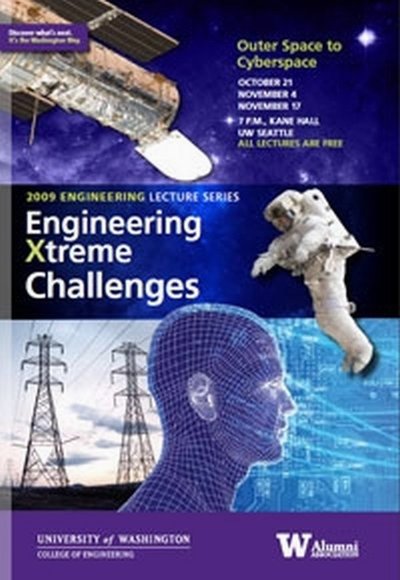October 15, 2009
NASA shuttle astronaut, energy ‘smart grids,’ cyber-security talks the focus of College of Engineering fall lecture series
A space-walking astronaut, a pair of cyber-security experts and energy-saving “smart grids” will be topics for the College of Engineering’s fall lecture series, which this year it titled Engineering Xtreme Challenges: Outer Space to Cyberspace. The three talks will be held in Kane Hall between Oct. 21 and Nov. 17.
Kicking off the series at 7 p.m. Wednesday, Oct. 21, in 120 Kane will be two cyber-security experts in the Department of Computer Science & Engineering. Assistant professors Magdalena Balazinska and Tadayoshi Kohno will explore opportunities and challenges in the flood of data inherent in the modern world in their talk, The Cyberspace Data Explosion: Boon or Black Hole?.
From the ocean bottom to deep space, scientists are monitoring environments at unprecedented scales. On a more personal level, radio-frequency identification chips embedded in Washington state enhanced drivers’ licenses, U.S. passports and Seattle transit passes can track people’s comings and goings. The data explosion offers both risk and benefit, both of which are being explored by UW researchers.
Astronaut and UW alumnus Gregory C. Johnson, who this spring piloted the final servicing mission to the Hubble Space Telescope, will be the second speaker, at 7 p.m. Wednesday, Nov. 4 in 130 Kane. Johnson flew the shuttle into space to capture the huge telescope and make complex repairs and upgrades during five spacewalks and will describe the experience in his talk, Eye on the Universe: Final Mission to Hubble.
The final lecture, at 7 p.m. Tuesday, Nov. 17, also in 130 Kane, offers an inside look at “smart grids” and other energy-saving technologies in the talk Energy Crisis, Smart Solutions. Carl Imhoff of the Pacific Northwest National Laboratory will discuss the lab’s role in the nation’s billion-dollar push to develop flexible, adaptable electricity grids that boost efficiency and improve reliability. The new grids are also designed to better accommodate renewable sources, such as wind, solar or tidal energy, and electric vehicles.
Co-presenter Shwetak Patel, assistant professor in the UW’s departments of Electrical Engineering and Computer Science & Engineering, will describe sensors that monitor energy use in the home to encourage efficiency among consumers.
The series is presented in collaboration with the UW Alumni Association. All lectures are free and open to the public, but seating is limited. Register online or by calling 206-543-0540. The series will be broadcast at a later date on UWTV.



